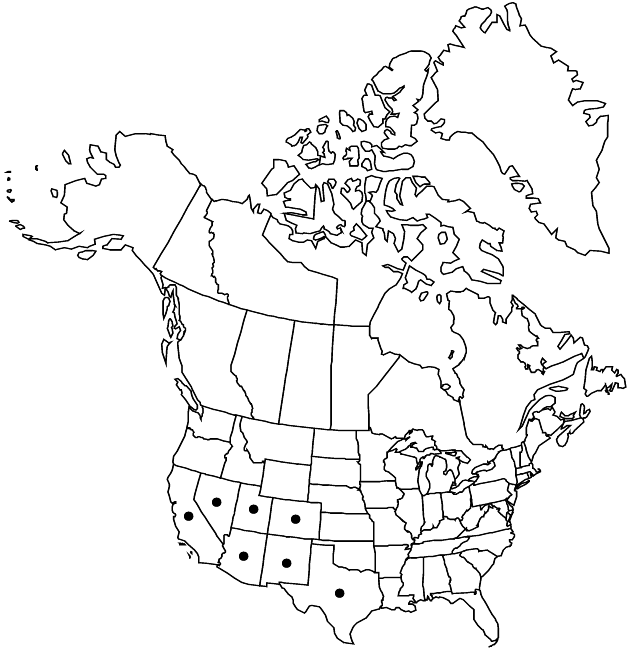Difference between revisions of "Artemisia bigelovii"
in War Department [U.S.], Pacif. Railr. Rep. 4(5): 110. 1857.
FNA>Volume Importer |
imported>Volume Importer |
||
| (3 intermediate revisions by 2 users not shown) | |||
| Line 1: | Line 1: | ||
{{Treatment/ID | {{Treatment/ID | ||
|accepted_name=Artemisia bigelovii | |accepted_name=Artemisia bigelovii | ||
| − | |accepted_authority=A. Gray | + | |accepted_authority=A. Gray |
|publications={{Treatment/Publication | |publications={{Treatment/Publication | ||
|title=in War Department [U.S.], Pacif. Railr. Rep. | |title=in War Department [U.S.], Pacif. Railr. Rep. | ||
| Line 8: | Line 8: | ||
}} | }} | ||
|common_names=Bigelow sagebrush | |common_names=Bigelow sagebrush | ||
| + | |special_status={{Treatment/ID/Special_status | ||
| + | |code=E | ||
| + | |label=Endemic | ||
| + | }} | ||
|basionyms= | |basionyms= | ||
|synonyms={{Treatment/ID/Synonym | |synonyms={{Treatment/ID/Synonym | ||
|name=Artemisia petrophila | |name=Artemisia petrophila | ||
|authority=Wooton & Standley | |authority=Wooton & Standley | ||
| + | |rank=species | ||
}} {{Treatment/ID/Synonym | }} {{Treatment/ID/Synonym | ||
|name=Seriphidium bigelovii | |name=Seriphidium bigelovii | ||
|authority=(A. Gray) K. Bremer & Humphries | |authority=(A. Gray) K. Bremer & Humphries | ||
| + | |rank=species | ||
}} | }} | ||
|hierarchy=Asteraceae;Asteraceae tribe Anthemideae;Artemisia;Artemisia subg. Tridentatae;Artemisia bigelovii | |hierarchy=Asteraceae;Asteraceae tribe Anthemideae;Artemisia;Artemisia subg. Tridentatae;Artemisia bigelovii | ||
| Line 39: | Line 45: | ||
-->{{#Taxon: | -->{{#Taxon: | ||
name=Artemisia bigelovii | name=Artemisia bigelovii | ||
| − | + | |authority=A. Gray | |
| − | |authority=A. Gray | ||
|rank=species | |rank=species | ||
|parent rank=subgenus | |parent rank=subgenus | ||
| Line 53: | Line 58: | ||
|publication title=in War Department [U.S.], Pacif. Railr. Rep. | |publication title=in War Department [U.S.], Pacif. Railr. Rep. | ||
|publication year=1857 | |publication year=1857 | ||
| − | |special status= | + | |special status=Endemic |
| − | |source xml=https:// | + | |source xml=https://bitbucket.org/aafc-mbb/fna-data-curation/src/2e0870ddd59836b60bcf96646a41e87ea5a5943a/coarse_grained_fna_xml/V19-20-21/V19_866.xml |
|tribe=Asteraceae tribe Anthemideae | |tribe=Asteraceae tribe Anthemideae | ||
|genus=Artemisia | |genus=Artemisia | ||
Latest revision as of 20:57, 5 November 2020
Shrubs, 20–40(–60) cm (branched from bases, rounded), mildly aromatic; not root-sprouting. Stems silvery, canescent (bark gray-brown). Leaves persistent, light gray-green; blades narrowly cuneate, 0.5–3 × 0.2–0.5 cm, entire or 3(–5)-lobed (lobes 1.5–2 mm, less than 1/3 blade lengths, acute), faces silvery canescent. Heads (usually nodding) in arrays 6–25 × 1–4 cm (branches erect, somewhat curved). Involucres globose, 2–3 × 1.5–2.5 mm. Phyllaries (8–15) ovate, canescent or tomentose. Florets: pistillate 0–2 (raylike, laminae to 1 mm); bisexual 1–3; corollas 1–1.5 mm (style branches of ray florets elongate, exsert, epapillate, tips acute; of disc florets, short, truncate, papillate). Cypselae (ellipsoid, 5-ribbed) 0.8–1 mm, glabrous. 2n = 18, 36, 72.
Phenology: Flowering early summer–late fall.
Habitat: Deserts, sandy or alkaline soils, rock outcrops
Elevation: 1000–2500 m
Distribution

Ariz., Calif., Colo., Nev., N.Mex., Tex., Utah.
Discussion
Artemisia bigelovii of the southwestern deserts is easily confused in the field with A. tridentata, even though it is well distinguished ecologically and morphologically. Systematic placement within subg. Tridentatae remains problematic. Presence of “ray” florets (though rare) and vestigial spines on the pollen (R. P. Wodehouse 1935) suggest a relationship with groups ancestral to Tridentatae. The species also has the unusual characteristic of lignified trichomes (L. M. Shultz 1986b). Further research may help to determine proper placement; its affinities may be with members of subg. Artemisia.
Selected References
None.